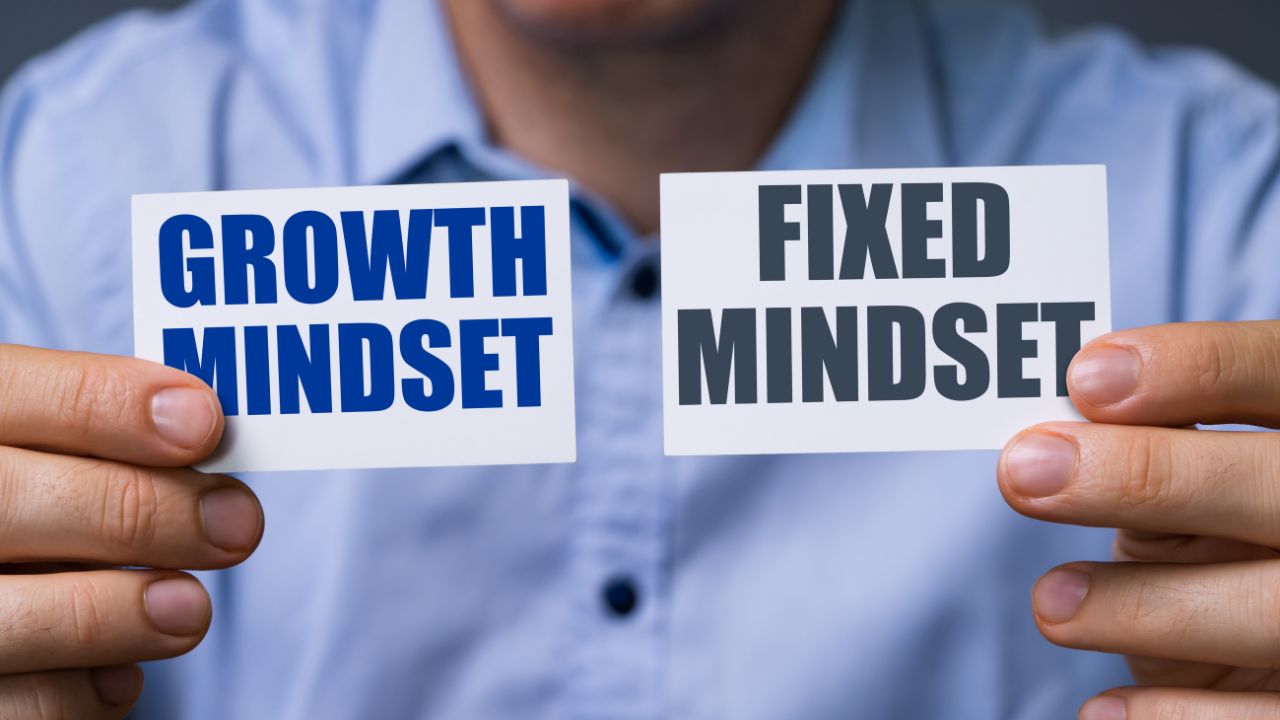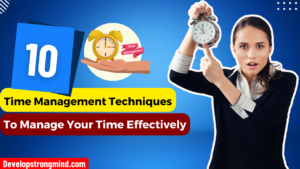Do you feel stuck in your personal and professional life? Do you want to reach your full potential and achieve your goals? Then I would like to tell you that the key to unlocking your potential lies in developing a growth mindset.
A growth mindset is a powerful tool that allows you to embrace challenges. learn from failure, and continuously improve. It’s about believing that your abilities and intelligence can be developed through hard work, dedication, and perseverance.
In this article, I will discuss what exactly is a growth mindset, how it is different from a fixed mindset, and how you can develop a growing mindset by using 15 practical ways that will help you thrive in all aspects of your life as well as propel you towards success.
Don’t let a fixed mindset hold you back from achieving your dreams. With the right mindset and a willingness to learn and grow, anything is possible. Let’s work on your mindset and get ready to unlock your full potential. Let’s get started…
Table of Contents
What is Mindset for Growth?
Mindset is the collection of beliefs, attitudes, and thoughts that shape our behavior and approach to life. It’s like a mental attitude or perspective that influences how you approach and handle different situations in life.
Our mindset is the way we think and feel about ourselves, others, and the world around us. It’s the lens through which we see the world and interpret our experiences.
Think of your mindset as a pair of glasses through which you see the world. Just like different glasses can give you a different view, different mindsets can shape your thoughts, feelings, and actions differently.
According to Standford psychologist Carol Dweck, there are two types of mindsets: Fixed Mindset and Mindset for growth. A fixed mindset is when you believe that your abilities, intelligence, and talents are fixed traits that cannot be changed.

You may avoid challenges, feel threatened by failure and give up easily. On the other Mindset for growth is when you believe that you can develop and improve your abilities through effort, learning, and perseverance.
You embrace challenges, see failure as an opportunity to learn, and are willing to put in the effort to achieve your goals. Developing a growth mindset can help you become more resilient, adaptable, and successful in all areas of life.
It can help you overcome setbacks and challenges, learn from failure and ultimately achieve your goals. Now let’s understand the major differences between the two types of mindset.
Growth Mindset Vs Fixed Mindset
Understand the difference between the two types of Mindset with the help of some examples: This difference will help you understand the exact meaning of these two types defined by the Standford psychologist Carol Dweck.
| Aspects | Growth Mindset | Fixed Mindset |
| Beliefs about abilities | Believes abilities can be developed and improved through effort, learning, and perseverance. | Believes abilities are fixed and cannot be changed. |
| Attitude towards challenges | Embrace challenges as opportunities to learn and grow. | Avoid challenges due to fear of failure. |
| Response to failure | Views failure as a chance to learn, improve and try again. | Views failure as a reflection of incompetence and giving up easily. |
| Efforts and perseverance | Values efforts and perseverance as key factors for success. | Believes that talent or abilities alone determine successes, and may give up if success is not immediate. |
| Feedback | Receives feedback as constructive criticism and seeks to improve based on it. | Takes feedback personally and may become defensive or discouraged by it. |
| Success of others | Celebrates and is inspired by the success of others. | Feels threatened by the success of others and may become envious or resentful. |
| View on learning | Emphasizes the importance of continuous learning and growth. | Views learning as unnecessary or not worthwhile once a certain level of skill or knowledge is attained. |
| Examples | “I may not be good at this yet, but with practice and effort, I can improve.” “I failed this test, but I can learn from my mistakes and do better next time.” “I enjoy learning new things and challenging myself to grow.” |
“I am just not good at this, I will never be able to do it.” “I failed this test, I am not that smart enough.” “I prefer to stick to what I know and avoid taking risks in life.” |
Which type of Mindset do you have?
Understanding your mindset is the first step towards Growth in life. Here are some of the questions you can ask yourself to identify the type of mindset you have.

- Do I believe that my abilities and intelligence are fixed traits or do I believe that I can develop and improve them over time?
- How do I react to failure or setbacks? Do I see them as opportunities for growth and learning, or Do I view them as evidence of my limitations?
- Am I open to new ideas and perspectives or do I tend to stick to my own beliefs and opinions without considering alternatives?
- How do I approach challenges and obstacles? Do I see them as opportunities to grow stronger or do I avoid them out of fear of failure?
- Do I tend to compare myself to others and feel threatened by their success, or do I genuinely celebrate their achievements and see them as a source of inspiration?
- Am I willing to take risks and step out of my comfort zone, or do I prefer to stay in familiar territory and avoid uncertainty?
- How do I handle criticism and feedback? Do I view them as opportunities for improvement or do I feel defensive and resistant to change?
- Do I believe that my mindset can be developed and changed, or do I see it as a fixed aspect of my personality?
- Do I tend to focus on the process and effort I put into achieving my goals or do I solely focus on the outcome and the end results?
- How do I approach learning and acquiring new skills? Do I have a learning mindset or avoid learning new things?
- Do I tend to focus on my limitations and what I cannot do, or do I focus on my strengths and what I can do?
- How do I view success? Do I believe that success is limited or do I believe that success is abundant and can be achieved by anyone who is willing to work for it?
Answering these questions honestly can give you valuable insights into your mindset. Mindset can change over time with awareness and effort. To develop that you need to first understand the type of mindset you have and then it becomes easy for you to take action toward developing a growth mindset.
15 Ways to Develop a Growth Mindset
You understand what is a mindset and the two types of mindsets, you also understand the importance of a growth mindset in life. Also, I have shared a list of effective questions by answering them you can identify the type of mindset you have.
So now it’s time to understand the practical ways with the help which you can develop Mindset for growth and achieve great results in your life. Let’s understand these ways one by one:
1. Focus on the process:
Individuals with a growth mindset focus on the process rather than the outcome. They understand that success is a result of hard work and dedication, and that progress takes time. Instead of worrying about the end result, focus on the process and enjoy the journey.
Use this technique while working on any professional and personal goal. For example, if you are trying to lose weight, don’t focus on the number on the scale. Instead, focus on developing healthy habits such as eating a healthy diet and exercising regularly.
2. Emphasize effort over natural ability:
Individuals with a growth mindset emphasize more on effort than natural ability. They understand that hard work and dedication are more important than natural talent or intelligence. So having a natural talent is good but you need to also focus on the effort to achieve great results.
For example, if you are trying to improve your public speaking skills, focus on practicing and improving your skills through hard work and dedication, instead of relying solely on natural talent. With practice and consistent effort, you can become a good public speaker.
3. See failure as opportunities:
Whatever you do in your life you will fail in that at first attempt and this happens with the majority of the people. After failure, you have two options leave that goal and do something else or you can give one more try with more effort.
People with a growth mindset definitely go for 2nd option because they believe that every failure is an opportunity to learn and improve yourself. Instead of seeing failure as a setback, they view it as a valuable learning experience and believe that failure is part of the learning process.
For example, if you are trying to learn a new skill and you don’t succeed at first, don’t give up. Instead, analyze what went wrong and use it as a learning opportunity to improve your approach. (Check out – How to become mentally strong?)
4. Be open to feedback:
People with a growth mindset view feedback as an opportunity to learn and grow. They understand that feedback is essential for personal growth and development. Feedback gives you a new perspective on things which opens your mind to think in a new direction.
For example, if you are working on a project, ask for feedback from trusted peers or mentors and use it to improve your work. Use you can feedback to improve your professional as well as personal life.
5. Focus on continuous learning:
One of the key elements of developing a growth mindset is to focus on continuous learning because the more you learn the more you earn and the more you grow in life. Be passionate about learning new skills & seek out new experiences, and opportunities to expand your knowledge as well as skills.
For example, let’s say you are interested in photography rather than simply taking photos with your smartphone, cultivate a love of learning by taking a photography course, reading books and articles on photography, and experimenting with different techniques and styles.
6. Surround yourself with growth-oriented people:
The most powerful way to develop a growth mindset is to be in a company of growth-oriented people. When you are in such a group you achieve goals and grow in life effortlessly. As you know, you become like those you spend time with.
If you are spending time with growth-oriented people you automatically become like them. So surrounding yourself with positive and supportive people can help you stay motivated and focused on your growth.
For example, if you are interested in entrepreneurship seek out successful entrepreneurs within your reach who can offer guidance and mentorship so that you can get clarity, saves your time and you can take action in the right direction.
7. Emphasize the power of ‘Yet’:
When you face a difficulty or fail at something, it’s common to think, “I can’t do this” or “I am not good at this”. However, if you add the word ‘Yet’ to the end of those statements, they become “I can’t do this yet” or “I am not good at this yet”.
By adding ‘Yet’ you can acknowledge that you have not achieved something yet, but it is still possible in the future with effort, learning, and practice. That’s how you can build a growth mindset by changing the way you talk to yourself.
For example, if you struggle with math, tell yourself that you don’t understand it yet, but with practice and persistence, you will. This simple change in self-talk helps you view your current abilities as a starting point and look forward to future growth.
8. Embrace your imperfections:
Embracing your imperfections is a crucial aspect of developing a growth mindset. When you view your imperfections as opportunities for growth and learning, you can overcome the fear of failure and pursue new challenges with confidence.
Best way of embracing imperfections is to reframe mistakes as valuable learning experiences. Nobody is perfect, and everyone makes mistakes along the way. By accepting this reality you can let go of the need for perfection and focus on progress instead.
Instead of criticizing yourself for your mistakes, treat yourself with kindness and understanding. Recognize that making mistakes is part of being human and by treating yourself with kindness you are giving yourself one more chance to learn and grow.
9. Stop seeking approval from others:
To develop a growth mindset, it’s important to focus on internal motivation and the desire to improve oneself, rather than seeking validation from external sources. When you focus too much on approval from others you end up limiting your own growth potential.
You should take ownership of your own growth and development, and view feedback from others as a helpful tool rather than a validation of your worth. Remember, growth and improvement come from within and the only approval you need is your own.
10. Face challenges with courage:
When faced with a challenging situation, individuals with a growth mindset view it as an opportunity to learn and grow. Instead of letting fear paralyze you, embrace the challenges as a chance to push yourself out of your comfort zone and into a new experience.
Every challenge presents an opportunity to learn something new, to develop a new skill, or to gain a deeper understanding of yourself and the world around you. Use every challenge in life to improve yourself and your abilities.
For example, if you are learning a new skill when the level increase and the topic becomes difficult to understand, be patient and instead of avoiding that difficult learning level, embrace that difficulty level as an opportunity to learn more and become a master at that skill.
11. Learn from the mistakes of others:
By observing the mistakes and failures of others, you can gain valuable insights and lessons without having to experience the negative consequences yourselves. This approach allows you to expand your knowledge and understanding of what works and what doesn’t work.
By learning from the mistakes of others, you can also avoid making the same mistakes yourself and improve your own performance. This approach requires a willingness to be humble and open to feedback from others.
This also helps you develop a more positive attitude toward your own mistakes and failure, seeing them as opportunities for growth and learning. By adopting this approach, you can develop a growth mindset that is rooted in continuous learning, improvement & willingness to face challenges.
12. Practice persistence:
Persistence refers to the act of continuing to pursue a goal or objectives despite setbacks, obstacles, or challenges that may arise along the way. It involves maintaining a positive attitude and a willingness to persevere through difficulties.
When you practice persistence, you develop resilience and grit, which are essential traits for success in any area of life. By persevering through obstacles and setbacks, you build confidence in your abilities and develop a sense of self-efficacy.
Over time, practicing persistence can help you develop a growth mindset, as you come to see challenges and obstacles as opportunities for growth and learning rather than threats to your abilities. (Check out – How to make your mindset strong?)
13. Work on your weakness:
You should appreciate your strengths but to develop a growth mindset you should also work on your weaknesses. Working on your weakness involves recognizing that you have room for improvement and that you can develop new skills and abilities through effort and practice.
When you focus on your weaknesses, you are taking a proactive approach to your personal and professional development. Rather than avoiding your weaknesses or making excuses for them, you should acknowledge them and take steps to overcome them.
This can involve seeking out training or education, practicing new skills, or working with a coach or mentor to improve your performance. By working on your weaknesses, you are actually building resilience and perseverance that ultimately develops a mindset for growth.
14. Practice Self-compassion:
Self-compassion is the practice of being kind and understanding towards yourself in times of difficulty or failure. When you practice self-compassion you are more likely to adopt a growth mindset because you are less likely to get stuck in negative self-talk and self-doubt.
Instead, you are able to acknowledge your mistakes and shortcomings without judgment or criticism and use them as opportunities for growth and learning. By being kind and gentle with yourself, you are more likely to take risks and try new things, even if you might fail.
Practicing self-compassion helps you develop a mindset for growth by fostering a more positive and resilient attitude towards yourselves and your abilities.
15. Find your purpose and work towards it:
Take some time for self-reflection and meditation because finding your purpose in life is very important and when you start working toward your purpose you are likely to encounter challenges and obstacles, you see a lot of failures and setbacks on that purpose-driven path.
But this path ultimately helps you develop a growth mindset. Your purpose gives you a reason for doing what you are doing and a goal to work towards. While working toward your purpose you consistently learn new things, improve yourself every day, connect with new people, and get new experiences.
When you get to know your purpose then you join the path of becoming the best version of yourself and you do everything to achieve your purpose or goal. In that entire process, you automatically develop a mindset for growth.(Check out – 60 best books to improve your Mindset)
Conclusion
Developing a growth mindset is a powerful tool for personal and professional growth and it can transform your life completely. By embracing the 15 ways I have discussed, you can unlock your true potential and achieve success beyond your wildest dreams
Remember Mindset is not fixed, but rather something that can be nurtured and cultivated over time. It’s about shifting your perspective, challenging your beliefs, and pushing yourself beyond your comfort zone.
With the right mindset, you can achieve greatness and create the future that you want. So go ahead and take that leap of faith towards a Mindset for growth. If you found this article useful then please share it in your network and subscribe to get more such articles every week.






Pingback: How to Find Your Purpose using 8 Powerful Strategies?
Pingback: Self Motivation: 10 Ways To Motivate Yourself For Success
Pingback: Vision Board: How To Make It To Reach Your Goals Faster In 2024